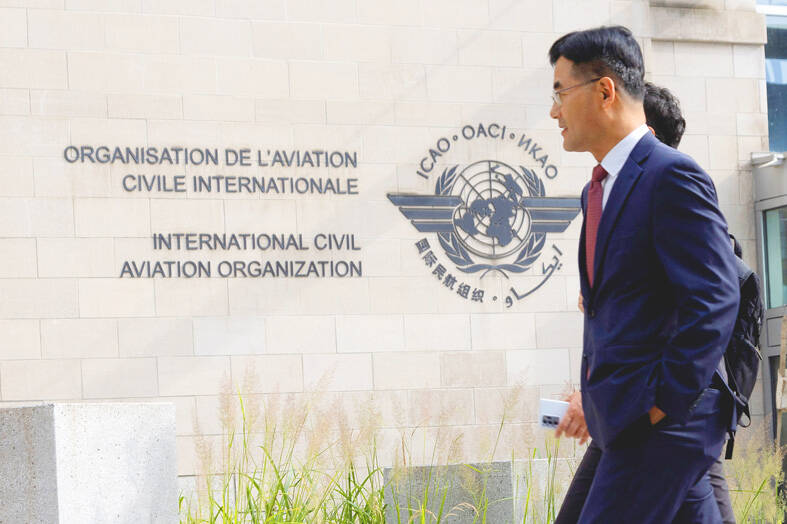Twenty-eight members of the European Parliament have sent a joint letter to leaders of the International Civil Aviation Organization (ICAO) and the EU to express concern over China’s unilateral decision to alter the M503 flight path.
The letter, which was sent on Wednesday last week, was addressed to ICAO Council President Salvatore Sciacchitano, European Commission President Ursula von der Leyen, European Council President Charles Michel, EU High Representative for Foreign Affairs and Security Policy Josep Borrell, European Commissioner for Climate Action Frans Timmermans and European Commissioner for Transport Adina Valean.
Jan-Christoph Oetjen, vice president of the European Parliament and vice chair of the Committee on Transport and Tourism, posted the letter on X yesterday, calling on the ICAO to “take immediate action.”

Photo: Reuters
Beijing on Jan. 30 announced changes to the M503 flight path, breaking its agreement with Taiwan that southbound flights on the route should operate 6 nautical miles (11km) southwest of the route.
Two days later, it commenced the W122 and W123 eastbound routes, which the two sides had agreed not to launch before confirming the details of their implementation.
Carrying out the changes without prior consultation with Taiwan “are in direct violation of established agreements between the two sides,” the letter said.
The actions also contravened section 4.2.6 of the ICAO’s Air Traffic Services Planning Manual, which stipulates that establishing and changing flight routes should be made “only after they have been coordinated with all parties concerned,” it said.
The letter said that China’s moves “are politically motivated,” as they were taken shortly after Taiwan completed its presidential and legislative elections on Jan. 13, and “without tangible evidence to demonstrate there are real traffic issues to be addressed.”
“This raises concerns about aviation infrastructure being used as a tool for geopolitical pressure,” it said.
Making the alterations unilaterally posed risks to regional stability and predictability, “potentially leading to misunderstandings and escalations” across the Taiwan Strait, it added.
Launching new routes would also “challenge air traffic management and raise the likelihood of incidents or accidents,” it said.
The disregard for Taiwan’s interests further hinders the nation’s participation in the ICAO, which “not only undermines Taiwan’s rights, but also hampers global efforts to ensure aviation safety,” the letter said.
The parliamentarians called for actions from the ICAO to “ensure compliance with established regulations and agreements.”
“It is essential to uphold the principles of transparency, cooperation, and respect for international norms in the management of civil aviation,” the letter added.
In Taipei, the Ministry of Foreign Affairs yesterday thanked the parliamentarians for expressing concern over the issue.
The signatories include members of four major parties in the European Parliament — the European People’s Party, Renew Europe, the European Conservatives and Reformists and the Greens/EFA Group — which showed that clear consensus exists in the parliament regarding China’s unilateral behavior and support for peace and stability in the Taiwan Strait, the ministry said in a press release.

CHAOS: Iranians took to the streets playing celebratory music after reports of Khamenei’s death on Saturday, while mourners also gathered in Tehran yesterday Iranian Supreme Leader Ayatollah Ali Khamenei was killed in a major attack on Iran launched by Israel and the US, throwing the future of the Islamic republic into doubt and raising the risk of regional instability. Iranian state television and the state-run IRNA news agency announced the 86-year-old’s death early yesterday. US President Donald Trump said it gave Iranians their “greatest chance” to “take back” their country. The announcements came after a joint US and Israeli aerial bombardment that targeted Iranian military and governmental sites. Trump said the “heavy and pinpoint bombing” would continue through the week or as long

TRUST: The KMT said it respected the US’ timing and considerations, and hoped it would continue to honor its commitments to helping Taiwan bolster its defenses and deterrence US President Donald Trump is delaying a multibillion-dollar arms sale to Taiwan to ensure his visit to Beijing is successful, a New York Times report said. The weapons sales package has stalled in the US Department of State, the report said, citing US officials it did not identify. The White House has told agencies not to push forward ahead of Trump’s meeting with Chinese President Xi Jinping (習近平), it said. The two last month held a phone call to discuss trade and geopolitical flashpoints ahead of the summit. Xi raised the Taiwan issue and urged the US to handle arms sales to

BIG SPENDERS: Foreign investors bought the most Taiwan equities since 2005, signaling confidence that an AI boom would continue to benefit chipmakers Taiwan Semiconductor Manufacturing Co’s (TSMC, 台積電) market capitalization swelled to US$2 trillion for the first time following a 4.25 percent rally in its American depositary receipts (ADR) overnight, putting the world’s biggest contract chipmaker sixth on the list of the world’s biggest companies by market capitalization, just behind Amazon.com Inc. The site CompaniesMarketcap.com ranked TSMC ahead of Saudi Aramco and Meta Platforms Inc. The Taiwanese company’s ADRs on Tuesday surged to US$385.75 on the New York Stock Exchange, as strong demand for artificial intelligence (AI) applications led to chip supply constraints and boost revenue growth to record-breaking levels. Each TSMC ADR represents

State-run CPC Corp, Taiwan (CPC, 台灣中油) yesterday said that it had confirmed on Saturday night with its liquefied natural gas (LNG) and crude oil suppliers that shipments are proceeding as scheduled and that domestic supplies remain unaffected. The CPC yesterday announced the gasoline and diesel prices will rise by NT$0.2 and NT$0.4 per liter, respectively, starting Monday, citing Middle East tensions and blizzards in the eastern United States. CPC also iterated it has been reducing the proportion of crude oil imports from the Middle East and diversifying its supply sources in the past few years in response to geopolitical risks, expanding